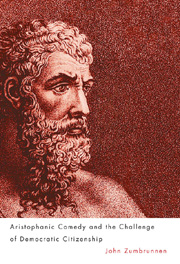Book contents
- Frontmatter
- Contents
- Acknowledgments
- Introduction
- 1 Peaceful Voyages: Peace and Lysistrata
- 2 Ordinary Citizens, High Culture, and the Salvation of the City: Clouds, Women at the Thesmophoria, and Frogs
- 3 Archē and the Anger of the Ordinary Citizen: Wasps and Birds
- 4 Elite Domination and the Clever Citizen: Acharnians and Knights
- 5 Fantasy, Irony, and Economic Justice: Assemblywomen and Wealth
- Conclusion: Democratic Possibilities
- Notes
- Bibliography
- Index
5 - Fantasy, Irony, and Economic Justice: Assemblywomen and Wealth
Published online by Cambridge University Press: 05 February 2013
- Frontmatter
- Contents
- Acknowledgments
- Introduction
- 1 Peaceful Voyages: Peace and Lysistrata
- 2 Ordinary Citizens, High Culture, and the Salvation of the City: Clouds, Women at the Thesmophoria, and Frogs
- 3 Archē and the Anger of the Ordinary Citizen: Wasps and Birds
- 4 Elite Domination and the Clever Citizen: Acharnians and Knights
- 5 Fantasy, Irony, and Economic Justice: Assemblywomen and Wealth
- Conclusion: Democratic Possibilities
- Notes
- Bibliography
- Index
Summary
The last chapter ended with the suggestion that cleverness, while central to the sort of ordinary citizenship that might resist elite domination, may coexist with the kind of anger considered in chapter 3. Chapter 3, for its part, ended with the idea of moving beyond the limitations of a reality in which the maddening contingency of archē inspires rage. This chapter returns to the possibility of new beginnings, offering a reading of Aristophanes's final two surviving comedies, Assemblywomen and Wealth. I find emerging from a juxtaposition of these two plays a kind of comic recognition that, I argue, works by holding fantasy and irony in perpetual and productive tension with one another.
The English term “fantasy” has etymological roots in the Greek phantazomai, to appear, and phantasia, imagination. Though Aristophanes uses neither term, I here draw from Assemblywomen and Wealth an understanding of fantasy as imagining possibilities that involve overcoming limits or boundaries imposed by everyday reality. In this sense, the fantasy of fundamental material redistribution stands as a central element of the comic appeal of both plays. In Assemblywomen, the intrepid Praxagora leads the women of Athens in a plot to seize control of the city from the men; once in power, they institute a scheme of communal property designed to ensure economic equality for all. The hero of Wealth, an ordinary citizen named Chremylus, discovers that the just souls among us are poor because the god Wealth is, literally, blind; after he manages to restore the god's sight, the just become wealthy and the unjust soon enough change their ways so that they too might regain their riches.
- Type
- Chapter
- Information
- Publisher: Boydell & BrewerPrint publication year: 2012



